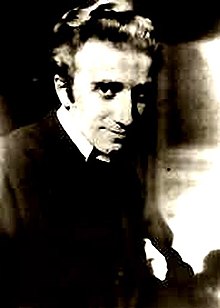Pitigrilli
Pitigrilli ( pseudonym of Dino Segre; born May 9, 1893 in Turin , † May 8, 1975 ibid) was an Italian writer , journalist and doctor of law . He became known in the 1920s and 1930s as the author of controversial and repeatedly banned books at the time. His best-known novel Kokain was briefly placed on the index for writings harmful to young people in the Federal Republic of Germany in 1988 .
Life
Segre attended a Dominican- run high school. He published his first articles in student newspapers, later he worked as an editor for various newspapers and in 1924 founded the magazine Le Grandi Firme (The Big Names). He spent the 1920s as a newspaper correspondent in Paris. It was there that his first, already hotly debated books were written. At the beginning of the 1930s he was hired by the Mussolini regime as a spy to spy on anti-fascist resistance groups (such as those of Leone Ginzburg ). After the race laws of 1938 came into force in fascist Italy , he had to emigrate because of his “ Jewish ” origins, first to Switzerland , then to Argentina . With the books that he wrote after his return from exile in 1957, the formerly cynical skeptic Pitigrilli documented his turn to moralism and his late commitment to Catholicism . From then on he turned against reprints of his early novels.
Literary style
Pitigrilli's strength was not so much the big story arc as the witty, bitingly cynical aperçu with which he analyzed gender roles and people's fixation on sexuality and procreation. From today's perspective, these aphorisms often seem hostile to women: “ Quando una donna ha un bel paio di gambe può permettersi la libertà di essere analfabeta. Valgono di più due polpacci femminili che tutto lo spirito di Rabelais ”(German:“ If a woman has a couple of beautiful legs, she can afford the luxury of being illiterate. Two female calves weigh more than the whole spirit of Rabelais . ” )
Quotes
“What was the dangerous thing about Pitigrilli? The frank adroitness with which he treated the myths of his society, the skepticism, the impartiality with which he used paradoxes that were thought to be destructive, the ironic sobriety with which he spoke of adultery and false ideologies. "
Novels and short story collections
-
Mammiferi di lusso. 1920
- Luxury bitch. Translation by Maria Gagliardi. Eden-Verlag, 1925/1953; Revised edition: Rowohlt, Reinbek 1988, ISBN 3-499-12201-4
-
La cintura di castità. 1921
- The chastity belt. Translation by Maria Gagliardi. Eden-Verlag, 1928/1953; edited edition under the title betray me well. Rowohlt, Reinbek 1987, ISBN 3-499-12179-4
-
Cocaina. 1921
- Cocaine . Novel. Translation by Maria Gagliardi. Eden-Verlag, 1927/1953; Matthes and Seitz, Munich 1979, ISBN 3-88221-308-6 (with an afterword by Peter Weibel ); Revised edition: Rowohlt, Reinbek 1988, ISBN 3-499-12225-1
-
Oltraggio al Pudore. 1922
- The wrong way. Translation by Maria Gagliardi. Eden-Verlag, 1928/1953; Revised edition: Rowohlt, Reinbek 1988, ISBN 3-499-15987-2
-
La Vergine a 18 carati. 1924
- The virgin of 18 carats. Novel. Translation by Maria Gagliardi. Eden-Verlag, 1927/1953; Revised edition: Rowohlt, Reinbek 1987, ISBN 3-499-12150-6
-
L'esperimento di Pott. 1929
- A person chases love. Novel. Translation by Manfred Georg. Eden-Verlag, 1930/1953; Revised edition: Rowohlt, Reinbek 1987, ISBN 3-499-15979-1
-
I vegetariani dell'amore. 1929
- Yvette teaches French. Translation by Manfred Georg. Eden-Verlag, 1931/1953; edited edition under the title Vegetarians of Love. Rowohlt, Reinbek 1988, ISBN 3-499-12240-5
Web links
- Literature by and about Pitigrilli in the catalog of the German National Library
- Pitigrilli , website on the life and work of Remigio Creghel & Vittore Sollanzi with a short biography (Italian)
Individual evidence
- ↑ Peter Hans Göpfert: The snow of today . In: Berliner Morgenpost . February 2, 2004
- ↑ Robin Detje : Theater: Djangotts blood bath . In: Die Zeit , No. 7/2004
- ↑ Blurb of the Rowohlt edition of Fraud me well
| personal data | |
|---|---|
| SURNAME | Pitigrilli |
| ALTERNATIVE NAMES | Segre, dino |
| BRIEF DESCRIPTION | Italian writer, journalist and legal scholar |
| DATE OF BIRTH | May 9, 1893 |
| PLACE OF BIRTH | Turin |
| DATE OF DEATH | May 8, 1975 |
| Place of death | Turin |
